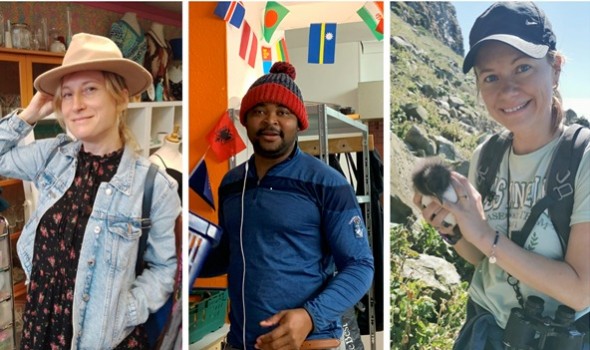The joys of volunteering
The joys of volunteering

From left to right: Oksana Borysova, Yves, Anna Treder
More than 14 million people in the UK volunteer through a group, club or organisation at least once a year, with women and 65-74-year-olds the most prominent groups. The voluntary sector’s total annual income is about £57 billion a year, according to the UK Civil Society Almanac. As with every other aspect of British life, migrants contribute to this vital resource. Four migrants in Scotland talks about their volunteering experience
Oksana Borysova, Ukraine
After a year of war, I was forced to leave Ukraine - my home, my parents, my husband and my job in a publishing house. I was afraid of the rocket explosions in Ukrainian cities and missile strikes on Ukrainian nuclear energy. Electricity was available at hourly intervals and everyone who could do so bought gasoline generators, power banks and candles. Many people fled to bomb shelters or left the country to save their children.
I came to Glasgow with my daughter in February 2023. I was 41, my daughter 16.
Scotland greeted Ukrainians warmly. My daughter got the opportunity to go to school. She was safe and had a normal life. She can develop her talents and interact with friends. It helped her recover from stress and that was most important to me. I have also studied English at college here.
I was accepted as a volunteer at the charity shop Help 4 The Homeless in Clydebank. It is a voluntary non-profit community group supporting people experiencing severe poverty and homelessness. Everything it provides is free.
Melody, the manager, and many others are very kind, cheerful, friendly people. My tasks were to iron clothes, put them on hangers and sort clothes, toys, books, dishes and more. During breaks, we got tea, coffee and fun conversations. Volunteers from Poland also helped.
I am still a volunteer there because I like helping people, being useful, meeting new friends and communicating with people. Many of the shop's beneficiaries are migrants.
I am also happy to be a volunteer with Migrant Voice. It is a good team of professionals. In Ukraine I worked as a designer in a printing house and here I was helped to quickly learn a new graphic design programme. My main role has been designing monthly zines which share stories written by people from different cultural backgrounds.
I love volunteering because I get a great experience and it helps improve my English skills.
Yves, Cameroon
I’ve been in Scotland for three years. I sought security because my life in Cameroon was in danger.
One day I came to the Central West Integration Network (CWIN) food bank in Glasgow, and while in the queue I thought that maybe I could help others in the same situation by volunteering.
I pack food parcels, maintain order in the space, and help and guide people who come to pick up food. It’s something different every day: one day I’m at the till, another day I guide people, and every day I assist in cleaning the area. We also have training opportunities and events.
Many people use the food bank. They are from all around the world — refugees, asylum seekers, but also Scottish people. We have old and young.
My favourite thing about volunteering is that it helps socialising. Sometimes you feel lonely when you live here alone, but in this space you can share experiences and socialise. People often ask me questions, and it’s great to help and advise them and feel part of something bigger.
Wafaa, Sudan
I came to Scotland over a year ago. I fled Sudan with my family because of war.
In Sudan I was a lecturer at a university, but here, as an asylum seeker, I don’t have the right to work. I started volunteering with Community Infosource as a teaching assistant in their English classes, and recently I’ve become a teacher. The organisation helped me get a teaching qualification.
I have students from Afghanistan, Eritrea, Iran, Sri Lanka, Sudan, Ukraine. I used to work with beginners, now I teach pre-intermediate.
I really enjoy learning new Scottish words with my students. In Sudan I learned standard English, so I’m always excited to learn new local phrases and share them with my students.
Anna Treder, Poland
Growing up in a Polish village surrounded by an abundance of creatures, big and small, I developed a love for wildlife. That love for nature led me to doing a master’s degree in environmental protection and management.
I came to Scotland in 2012, for a couple of months to get some extra money that would enable me to better my career opportunities in Poland. I never thought I would stay for long but here I am many years later.
I have volunteered with several ecological, environmental, and nature and animal-oriented organisations. I was not only learning new skills and meeting interesting people, but also making valuable connections and, most importantly, I was helping organisations that care for nature.
I have participated in bird-ringing activities, and been involved in habitat management for reptiles and amphibians in central Scotland, where I dug ponds and caught newts and slowworms in Callander.
In 2020 I completed my master's thesis on the use of rainwater as a non-potable water source. I strive to reduce my environmental impact by choosing package-free products and by planting trees.
Additionally, I volunteer for a website that is a valuable repository of knowledge on Scottish wildlife and scenery.
In a paid capacity, I’ve worked as a bat technician, recording and observing bats in the darkness of churches and woods.
Today, I share my life with a charming yet bossy cat and a crazy, unpredictable dog.


